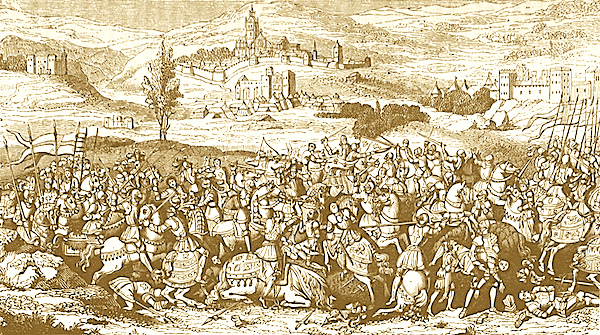| Jan/Feb 2014 • Salon |
| Jan/Feb 2014 • Salon |

Image courtesy of British Library Photostream
War is a game—a lethal game (or "match," if you like), but a game nonetheless. In the modern era, for the last couple hundred years, we all participate, if only passively as victims of its atrocities, assuming we don't do so as combatants. It's a game that affects everyone, but it still comes down to a winner and a loser, the contest decided by "sides" that perform and are directed in much the same way a more conventional sport like football or basketball is coached and managed.
This is a thought that has been growing on me for some time but only became obvious during my recent reading of Victor Klemperer's diaries of the Third Reich (I Will Bear Witness, 1933-1941 & 1942-1945). If the Nazis had fielded a soccer team instead of an army, and their opponents had done the same, and the outcome of the conflict including the fates of the populations of all the nations involved depended on who won the match, then the way the war was conducted, I mean the mentality of it, would not have been much different.
Yes, untold numbers of civilians were killed, sometimes slaughtered by the millions for racist rather than military reasons, but the essential character of the contest—their boys and ours struggling over territory and fighting for a final victory—remained that of a game. The "teams" met on a field (of battle) and fought for control of that field and for domination of the opposing team, using more or less the same tactics, i.e., playing according to the same rules of warfare that had been studied in military academies, out of the same books, no doubt.
Klemperer and his "Aryan" wife (hence his relatively privileged position and, ultimately, survival, compared with others designated as Jews by the Nazis) struggle to survive in an environment where the nation's resources are being heavily diverted to the fronts. He cheers on each rumor of an Allied advance and hopes to survive to see the day the Nazis finally "lose" the war (the pathos is almost unbearable without the reader knowing he will). Goebbels goes on the radio every other day and insists the prize goes not to who's ahead at the halfway mark but who breasts the tape first. Indeed, if it had not been for the shortages, the death camps, the merciless British bombers (a big "if," admittedly) Klemperer might have been waiting for the outcome of a critical, indeed life-and-death-involving sporting event. How much depended on that great game! How different the world would be if the losing side had been the winners.
I know how close to trivializing the horrific events of war what I'm saying may seem, especially for civilians who are victimized by it. But if evil can be banal, why should warfare not indeed be a kind of game, an "ultimate" sport that some people, if we are honest, yearn for? Think of the enthusiasm with which the populations of Europe signed up for the first world war, a murderous conflict that left civilians virtually untouched by comparison with the return match two decades later. In those early days of the war, they had the enthusiasm of fans gearing up for a European premier league championship match, only they were to be the players.
Nothing has changed since 1945, or 1914. We still wage war as if it were a game. We even name our wars beforehand, or at least give them epithets: "Shock and Awe," "Operation Defensive Shield." The militaries still plan and fight for "victory." If ending a brutal regime or toppling a legitimate one is the consequence, all well and good; the object is to win the game, and you do that by fielding the best team directed by the best managers. Meanwhile, the rest of us can do little but wait for the box scores and hope our team is ahead.
Even when the enemy is not available to fight on the field, when he attacks us "asymmetrically," as happened on 9/11, we still think in terms of conventional war, i.e. the game we know as war. We declare a "war on terror," as if we could fight a tactic the way we fight an army. We drone the enemy one by one, killing anyone near him as well, but we are at a loss to think in any other than the usual way about how to stop potential terrorists from perpetrating another attack on us. We fight "terror." It's as if we declared war on the soccer ball and by eliminating all soccer balls from the world we will end fan hooliganism.
War is vile. War of any kind, including the kind that takes place in bright interrogation rooms, is unthinkably horrific. War is, as one American pilot put it, a little girl calling for her mother as you rain down fire bombs and white phosphorus on both of them. War is humankind at its worst. War, as Heinrich Boell put it, is murder, pure and simple. It is not a game, unless what happened in the Roman Coliseum was a game or serial murder is a game. It's time we stopped pretending otherwise.